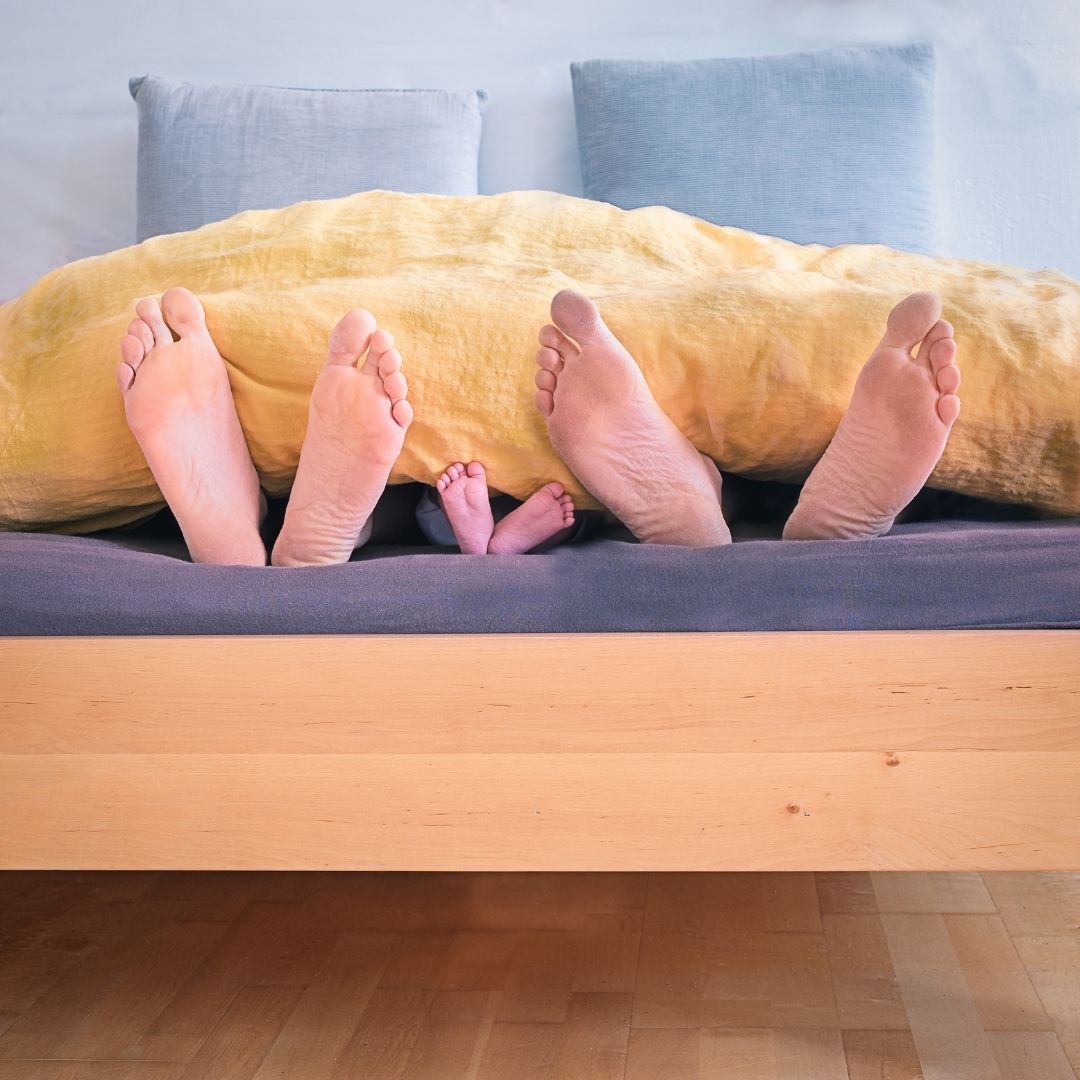Sex After Birth

We recently sat down with Cara aka @the_insta_midwife to talk about sex after birth which is a topic that we’ve had so many questions about. Cara is a practising midwife who works at a London hospital and has lots of great advice for pregnant women and new mums.
You must wait for this mythical 6 week check to make sure that you and the baby are okay. And very often women haven’t had sex at 6 weeks postpartum, so you go to this appointment panicked and worried that all your friends seem to be having sex but you’re not.
As you say this mythical 6-week check, that since covid it can be an 8 week check and I know that plenty women haven’t even had a postnatal check from the GP at all. As a midwife we will see women up to about 28 days, sometimes a lot less, and at that point for a lot of women the thought of sex hasn’t even crossed their mind. We mention contraception when we discharge to the GP and health visitor, and we go on our merry way. I think once you get to the 6-week mark there is a societal pressure to start thinking about sex again and I wonder why that is. Why does it come about at the magical 6-week mark? I understand that everyone is different and has different fears and worries in relation to it. But it does seem to be this magical 6-week mark when everything we’re expected to go completely back to normal and back to how you are pre-birth.
The 6-week mark is when the uterus goes back to normal. There is a myth that women feel embarrassed to speak to their doctor about it as they feel that pressure. When I was a community midwife, I used to see a lot of issues with women, especially if they’d had an episiotomy (we did far more episiotomies then, as I’ve been doing this for 40 years), they get frightened about looking down there and some are fearful of having sex. What do you say to women generally?
I think because we see women for a few weeks post-natal in the community, we do this contraception talk and a lot of the time women aren’t thinking about contraception yet, they are just thinking about their baby. I don’t think you get to have much of an in-depth conversation around sex after birth because you broach the subject and women are like “no! never again” like its never going to happen, you must read that and think okay you’re not ready to discuss it. And that’s probably a lot to do with the fact you’ve not recovered from birth in those first few weeks and even six weeks, who can honestly say that 6 weeks after having a baby their body is back to how it was pre pregnancy? It takes a lot of time to recover from birth and not just physically but mentally and emotionally too, all those things are massively intertwined in recovery, and we don’t give enough credit to that. For a lot of women its that fear of change down there and how it’s going to feel and what is the “damage” if you’ve had stitches and episiotomy or a caesarean. It doesn’t feel how it used to down there, you may have a weakened pelvic floor so you might still mildly be incontinent, all these things can make you feel less attractive.
A lot of women want to look great and lose their weight and the last thing they’re thinking about is sex. I see a lot of women who are trying for their second baby experiencing psychosexual problems where the man who was present in labour and have seen too much. Back in the day men were barely allowed in the room compared to know where there are video cameras, and they are fully involved sometimes to the detriment of a couple’s sex life.
I’ve heard a horrible analogy that has been said to me once “it’s like watching your favourite pub burn down”, you shouldn’t have to listen to someone say that about your body. Let’s be real you can make jokes, but this is someone’s body and when you’re pregnant and hormonal you may be feeling extra sensitive. We tend to separate pregnant bodies from ourselves, it’s like they’re two separate entities: how we used to be and how we are when pregnant. But they aren’t separate, our body has changed and grown a human being but it’s still us and we have done that. We must go on a journey with our bodies, we adapt and change and accept it because we’re growing a human being but when the human being is out, we think right the body should go back to how it was because now it’s done its job, and it doesn’t.
The change in our bodies can be quite a shock for many women.
We don’t talk about the acceptance of our bodies postpartum as much as we talk about the acceptance of our bodies in pregnancy. As well as the physical changes there are emotional changes and your whole instinct and being is about this baby, so you think you’ve got to be mother and nurturer and on top of that you’ve got to feel attractive and sexy and want to be desired and try to get back on the saddle. That’s a lot to take on board and for a lot of women it takes a lot longer than others. There is no correct time frame, it is about when you feel ready and for some people that might be 3 weeks, 6 week or a year plus. It is a big adjustment for your head and body to go through and for them to connect again.
What can a woman who’s struggling do?
Don’t ever feel pressured. It could be a societal pressure, if you’re in a breast-feeding group, a play group or baby massage group and the conversation comes around about how quickly you’re back in bed with your partner after you have a baby, you might not feel like taking part in the conversation because it doesn’t apply to you. We often feel embarrassed to not take part and that is the societal pressure. It’s such a shame because sex was always that taboo subject, but we talk about it so much more openly now and I think after you have a baby it’s expected to have a conversation about it, but you should never feel pressure from anybody. It also depends on your birth experience and if you’ve suffered trauma. Women carry trauma in all kinds of birth experiences and it’s important to get to the bottom of why and how those things happened for you to process it, once you can process things that have happened you can close the lid on that and accept what happened. Once you have deal with the birth aspect you can move onto the postnatal aspect. Breast feeding journeys are wide varied and often difficult, you might not have had support so could be carrying grief around your breastfeeding journey, and again all these things can impact on your emotional state and when you’re struggling with bits and pieces of baggage you’ve packed up along your pregnancy and birth experience. They’re all going to have a negative impact on just how readily you want to get back into having sex again. Ultimately having sex needs oxytocin and we talk about that with birth, your oxytocin needs to be flowing to have a positive birth experience and the same thing for sex, you need to be in the right frame of mind you need to be happy and relaxed and if you’re carrying all this emotional baggage then your heart and mind are not in it. If you’re just going through the motions, you’re setting yourself up again for a negative experience. If you have a negative experience the first time you have sex again after having a baby, you’re not going to be rushing back to do it again and that can impact your relationship.
What can women do for aftercare post birth?
I recommend for women to contact someone who can go through their notes and timeline of events. My first birth experience wasn’t great, and I think it’s the same for a lot of us. For me, going through my notes from my birth meant I could piece together missing parts of the jigsaw puzzle. You blank out a lot of it or the time frame doesn’t always add up. If you’ve had pethidine, you’re missing whole chunks and hours of things that have happened and it’s all a little bit fragmented. If something was explained to you at the time but you don’t remember it being explained or you forget what was said, seeing your notes will help it to make a little more sense.
Being able to go through it with a professional normalizes it and makes it less traumatising and abnormal.
Yes, your brain has a coping mechanism of magnifying certain aspects and cutting other aspects out, so some aspects of your labour will be forgotten or magnified. So often going through and seeing what happened at certain times you can recognise what you’ve cut out or gotten wrong. If that isn’t an option, you can speak with your GP who will put you in contact with secondary care or talking therapies. And again, if that’s not an option and you want something quicker there are private options like birth trauma counsellors, rewind therapy and birth trauma therapies. There are many different options.
Psychosexual problems with men are tough too.
Absolutely, and men often get overlooked and its not because they’re not important, but the person giving birth is at the forefront of the situation and therefore the focus is on them. Men suffer postnatal depression too, and its more common than we realise. The birth experience can trigger an awful lot for a man as well, so it’s worth delving into those feelings and looking to see if there’s an outlet for him. It might be a worth a trip to the GP to see if there are birth trauma counsellors that specialise in speaking to men.
Are birth trauma counsellors part of the NHS or are they mainly private?
They are mainly private; I am yet to come across any birth trauma counselling that is funded by the NHS. There is secondary care, but the NHS is on its knees at the moment, so a lot of services have discontinued or disbanded. Often in a lot of these cases its down to seeking out private help. Fortunately, these therapies aren’t extortionately expensive. Everyone has different financial circumstances but we’re not talking hundreds of pounds but rather a restaurant meal.
During covid there has been a huge increase in birth trauma, some due to not being able to have your partner with you and it takes women a while to come out of it.
Absolutely, I’ve read some of the most harrowing stories of what women have gone through, certainly in the beginning of the pandemic when we didn’t know what was going or what we were dealing with, there was no PPE, services were closed with no warning, and no one was allowed in a hospital. Women have suffered greatly and unnecessarily during the pandemic; we shouldn’t be coercing women to have certain things done so it ticks a box and allows certain people into the hospital. Women are severely traumatised after having to give birth alone or having to receive horrific news on their own. All these things are awful so there’s been a massive increase in the number of women who have suffered trauma around birth and labour.
Has there been an increase in the number of women with postnatal depression?
I don’t know statistics, but I can tell you from the women that I have seen I would lay money on it. Support was in very short supply, even down to contact visits, and those first few days when you get home with a new baby are some of the most lonely, hard, and emotional times that you could possibly face. And all you want is someone to come in and sit with you, reassure, help, support, and advise you. We couldn’t do that, and I found that personally so hard because talking on the phone to somebody is not the same, that whole human touch was so lost, and we need that so badly especially after birth.
Check out @the_insta_midwife on Instagram and check out her blog on sex after birth.



